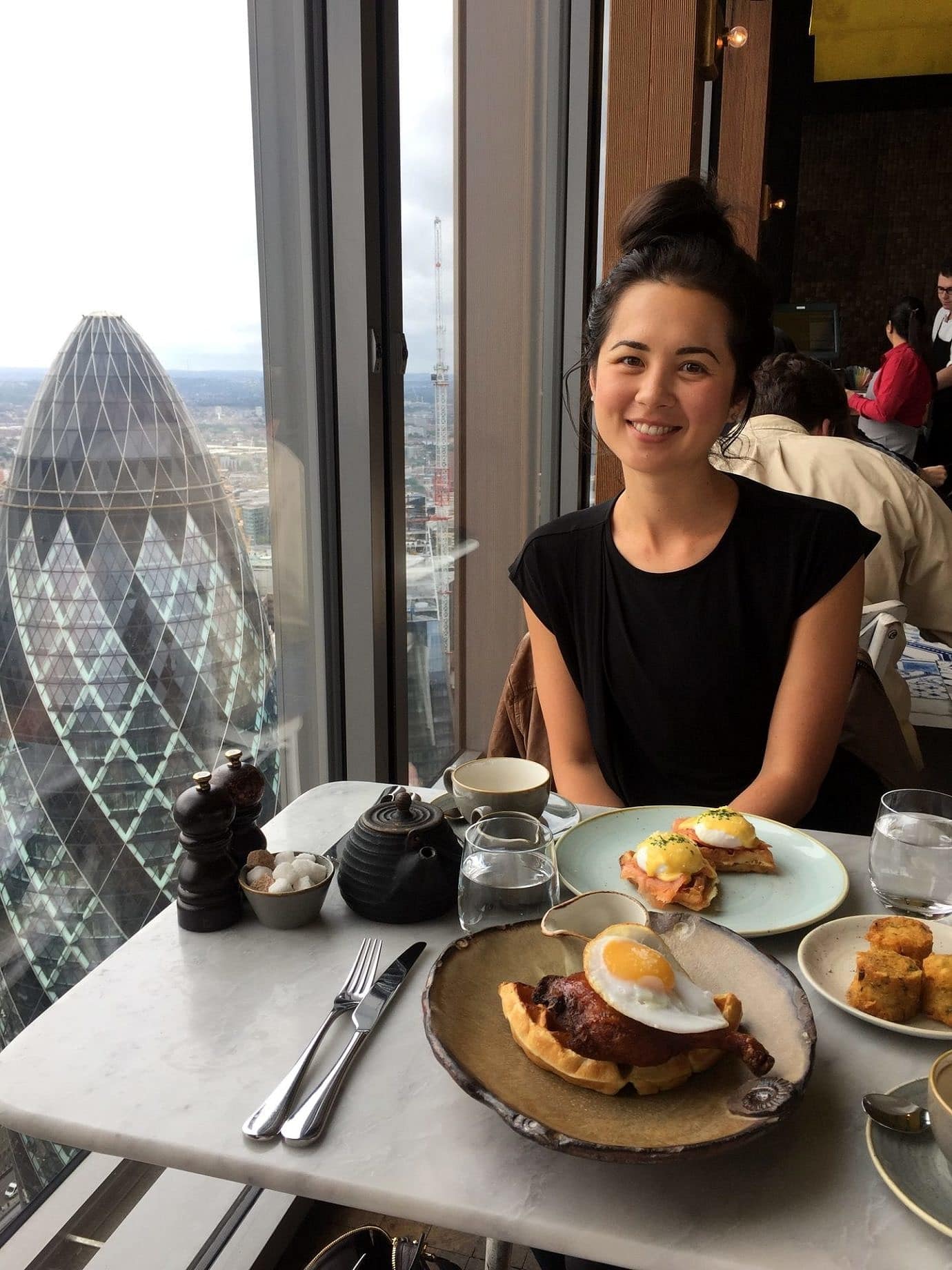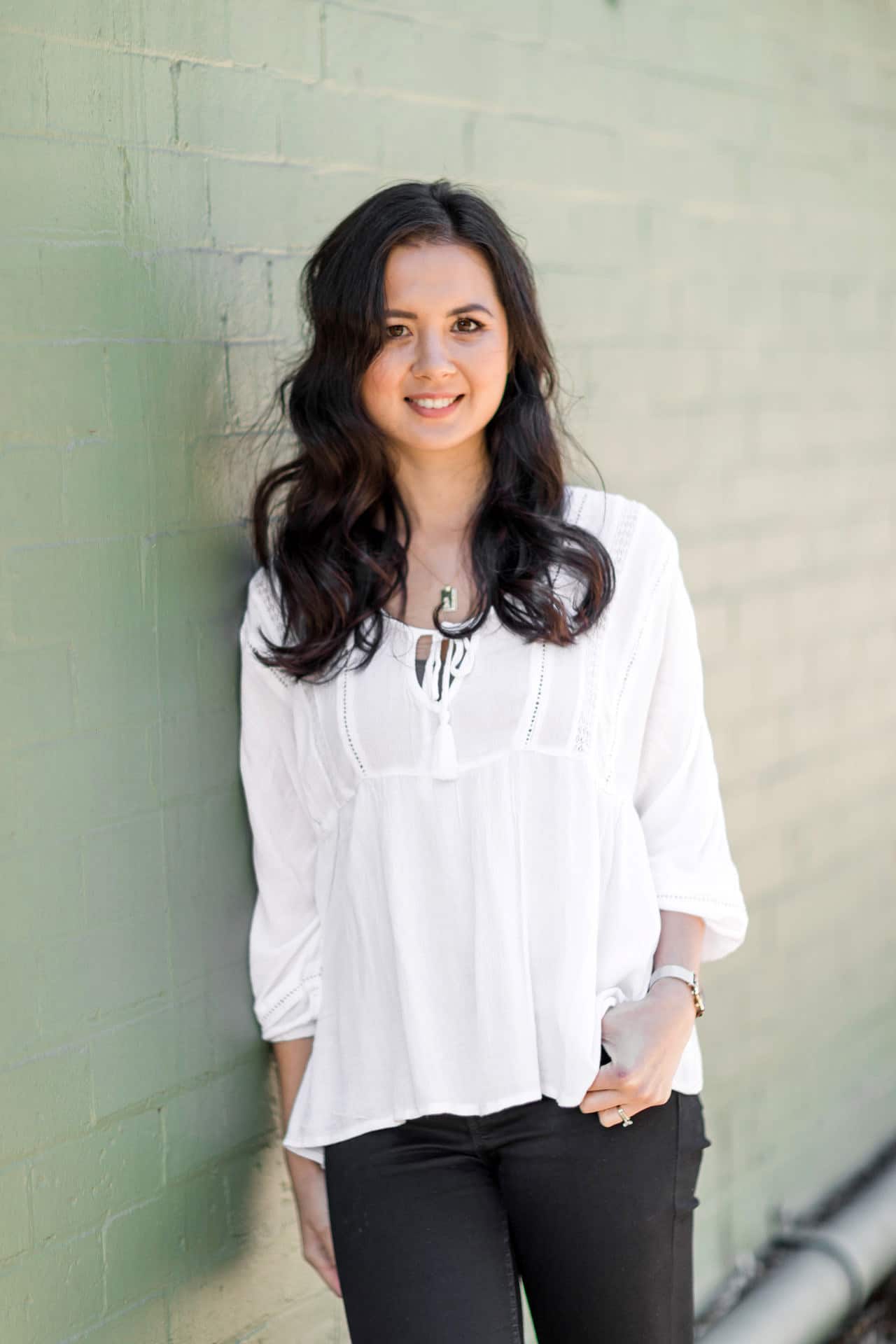My fertility story is intertwined with my experience of disordered eating. I lost a lot of weight, I lost my periods (hypothalamic amenorrhea) and I struggled to fall pregnant. My story does have a happy ending, yes, but it didn’t come easily...

I have been open about my experience with disordered eating on this blog before (see here, here and here). In short, I was anorexic/orthorexic for around 2 to 3 years in my early twenties. My chronic under-eating, over-exercise and high anxiety had consequences for my fertility, which stuck with me for years, even after I changed my behaviour.
This is mainly a story about hypothalamic amenorrhea.
What is hypothalamic amenorrhea?
Years ago I would have assumed not many people had heard of this, but sadly, I am hearing about women with this condition more and more.
Hypothalamic amenorrhea is a lack of periods due to insufficient female hormones (oestrogen and progesterone). This type of amenorrhea (= no period) happens because the brain (a part called the hypothalamus) stops sending signals down the hypothalamic-pituitary-axis which is what usually transmits the body’s messages to make oestrogen and progesterone, and have a menstrual cycle.
Common causes of hypothalamic amenorrhea are:
- being underweight,
- disordered/restrictive eating,
- excessive exercise, and/or
- high anxiety and stress.
In other words, things that put your body into “power save” mode. Biologically, it makes sense – if the body doesn’t believe that it is in a “safe” place, it will make sure you aren’t able to reproduce in those conditions.
It’s not only women with eating disorders or disordered eating habits who develop hypothalamic amenorrhea. It’s also fairly common in female athletes who have intense exercise regimes, strict diets and high energy demands.
My experience with hypothalamic amenorrhea
I used to be obsessed with what I though was a “clean and healthy” diet (i.e. extremely low carb, fat-free, insufficient calories) and intense exercise. I lost between 20-25% of my body weight. I was constantly anxious about choosing “healthy” food and getting to the gym.
At this point in my early twenties, fertility wasn’t a priority. Plus, I was on the contraceptive pill, so I had no idea of the impact of my behaviour on my fertility. My body was getting oestrogen and progesterone from the pill, and consequently, a withdrawal bleed “period” each month (it’s not an actual period because you do not ovulate when you are on the pill).
By my mid twenties, I had taken steps to address my anxiety, restored most of my weight and cut back on exercise. By the time of my wedding in 2014, I was much happier. Though, I was still running and doing gym classes (combined, I was exercising probably 4 times a week, plus a lot of incidental walking).
I decided then that I wanted to go off the pill. I don’t know why, but I just had started worrying, even though we weren’t quite ready for kids. Well what do you know…I never got my period.
How I dealt with hypothalamic amenorrhea

Short answer: NOT quickly! And not without STRUGGLE.
Long answer…
First things first I obtained a proper diagnosis. In late 2014 I saw a fantastic endocrinologist, had blood tests and a pelvic ultrasound. This confirmed hypothalamic amenorrhea. The endocrinologist’s advice? Stop running, take up yoga, practice deep breathing, enjoy my food.
Yes it sounds delightful – essentially, stretch and eat some fries – but trying to implement this when you spent years doing the opposite actually doesn’t come naturally.
I wish I had thrown myself at this with more enthusiasm, but in complete honesty it took me at least a year to really get on board. As a high-achieving, perfectionistic female who had recently started studying nutrition, I was highly susceptible to what I will call a subconscious diet mentality. It was little things, like choosing the most healthy option rather than the thing on a menu I really wanted to eat. Or feeling uncomfortable about having a meal with no veggies in it. I wasn’t dieting, but I was still quite cautious about food.
The reality is, if you have hypothalamic amenorrhea, you need to LET GO. It doesn’t mean shovelling cheeseburgers down for every meal, but it does mean you have to make real change to add more calories into your diet and build up those hormones. Not just a larger serving of zucchini noodles! (And, regardless of whether you have hypothalamic amenorrhea or not, we could all do with shoving diet culture in the bin. Honestly. Having this happen to me really woke me up to how much the diet mentality drains us all.)
Though I’d gained back a lot of weight already before my diagnosis, I still did not have enough body fat and a high enough energy intake to support ovulation and periods. I had to make more of an effort. I felt a real urge to be my absolute “healthiest self”, all the time…yet this urge wasn’t actually getting me to a point of genuinely good health. It was a real learning curve.
So how did I deal with hypothalamic amenorrhea? In the end:
- I ate more delicious food and put on a few more kilos;
- I did not do any intense exercise especially long bursts of cardio. Got rid of my gym membership and quit running; and
- I made an effort to try new gentle activities like yoga. I was also living in the UK at the time so had quite a few European summer holidays – um, basically the most perfect way to take my mind off things.

The difficult truth: I didn’t recover fully before we starting trying for a baby.
This is the hardest part for me to write, because (especially as a nutritionist, understanding physiologically what was wrong) I feel like I should have been able to “fix myself”.
But the truth is, what followed after finding out I had hypothalamic amenorrhea were years of making changes, and years where having a baby became more important…yet getting my period seemed less and less likely. And like I said, I was a bit slow to really make solid changes, too. I feel silly now, and I wish I could go back and change it, but it’s my reality.
During these years, a number of things happened, including:
- repeated investigations with endocrinologists and doctors to monitor hormone levels;
- ongoing commitment to eating freely, and gentle movement only;
- lots of yoga and lots of great acupuncture sessions;
- experimentation with different supplements (yes, I once held on to the hope that a supplement would fix everything, but hypothalamic amenorrhea does not work like that); and
- a stint on hormone replacement therapy to see if it would kick-start my periods (I didn’t actually want to go on this, but a different endocrinologist who I was sent to put me on it).
I really want to emphasise how much my mindset and behaviour changed by the end of this experience. I took so much more pleasure in food, and did a complete 180 about exercise. I wanted to help my hormones so desperately.
In 2017, we finally decided to have fertility investigations at a private hospital in the UK (both me and hubs were tested, just to make sure we were both okay). The wonderful news was that my hormone levels had more than quadrupled since 2014. My changes had not been in vain, and this part was great to hear. However, my cycle still had not come back, despite my hormones now being within the normal reference range (at the lower end of this range, though).
By this time, my heart was so heavy and sad. I had basically given up hope of getting my period, and I was starting to cry when I saw babies. I couldn’t stop thinking and worrying, crying and stressing. I’m a strong girl, but I felt like I couldn’t “fix” it, and in late 2017 we ended up starting assisted reproductive services. I was just so sad all the time, and all I wanted was to have a baby.
The next steps in my fertility journey

This blog post is already the length of a novel, so I’m going to end it here and write about my experience with assisted reproduction in another one. However, as you might have seen, I did end up having identical twin boys in January 2019!
And after that…importantly and amazingly for my fertility, I have managed to regain a menstrual cycle postpartum (at about 11 months postpartum).
If you have hypothalamic amenorrhea and are struggling with your fertility, my heart goes out to you. Please, keep working on yourself; the journey may not always be easy but persist with making positive changes. It will be helping you, even if your cycle isn’t back yet, hormone levels can be changing and this will help you to conceive and have a healthy pregnancy.
And if you have hypothalamic amenorrhea and haven’t yet considered your fertility – CONSIDER IT. It’s not only your fertility; bone and cardiovascular health are both also affected by hypothalamic amenorrhea (read more about the consequences of hypothalamic amenorrhea here).
*Note: This blog post is a personal account of my experience with hypothalamic amenorrhea. If you are worried about an absent menstrual cycle please see your doctor in the first instance, and get everything checked.

This is so refreshing to read!!! I have struggled with hypothalamic amnorreah for years! We have just finished ovulation induction (fertility lolrt treatment) and have fallen pregnant with a little baby boy! Thank you for sharing your story! And to all you amazing gals out there don’t give up!!! You are around and beautiful and can do it!
I’m not sure what Siri did with my spelling there! However it is supposed to say just fertility treatment. And you are all strong and beautiful!
Thank you so much for this lovely message Claire, and congratulations on your pregnancy!! xxx
Hi Monique
Thanks for this – it makes me feel like I’m not alone. I am in a similar situation as you and considering assisted reproduction. Could you share some more details about your journey – did you manage to conceive without having recovered your period, and what route did you go down?
Thanks
Hello Monique!
What a great blog post! I am in a similar situation as you and considering assisted reproduction. Could you share some more details about your journey? Did you manage to conceive without having recovered your period?
Hi Monique! Your blog was really helpful for me! Do you mind sharing more about your experience with assisted reproduction ??
And how you have managed to regain a menstrual cycle postpartum (at about 11 months postpartum)? 😍
Hi ,Alina.
Are you in the same boat ,mee to and desperate.
If you are too let chat about that.
Elena
Hi there!
I would like to know your experience with HRT. I was prescribed HRT through cyclic estrogen and progesterone, but after doing more research, I don’t know why this is going to be beneficial for my journey. I don’t think it’s going to be worth while
Hi Jessica, I was only on HRT for a very short amount of time – like you, I did not think that it was ultimately going to be beneficial in restoring my menstrual cycle and fertility. If you have concerns I would suggest returning to your specialist for further advice or potentially seeking a second opinion. Good luck!